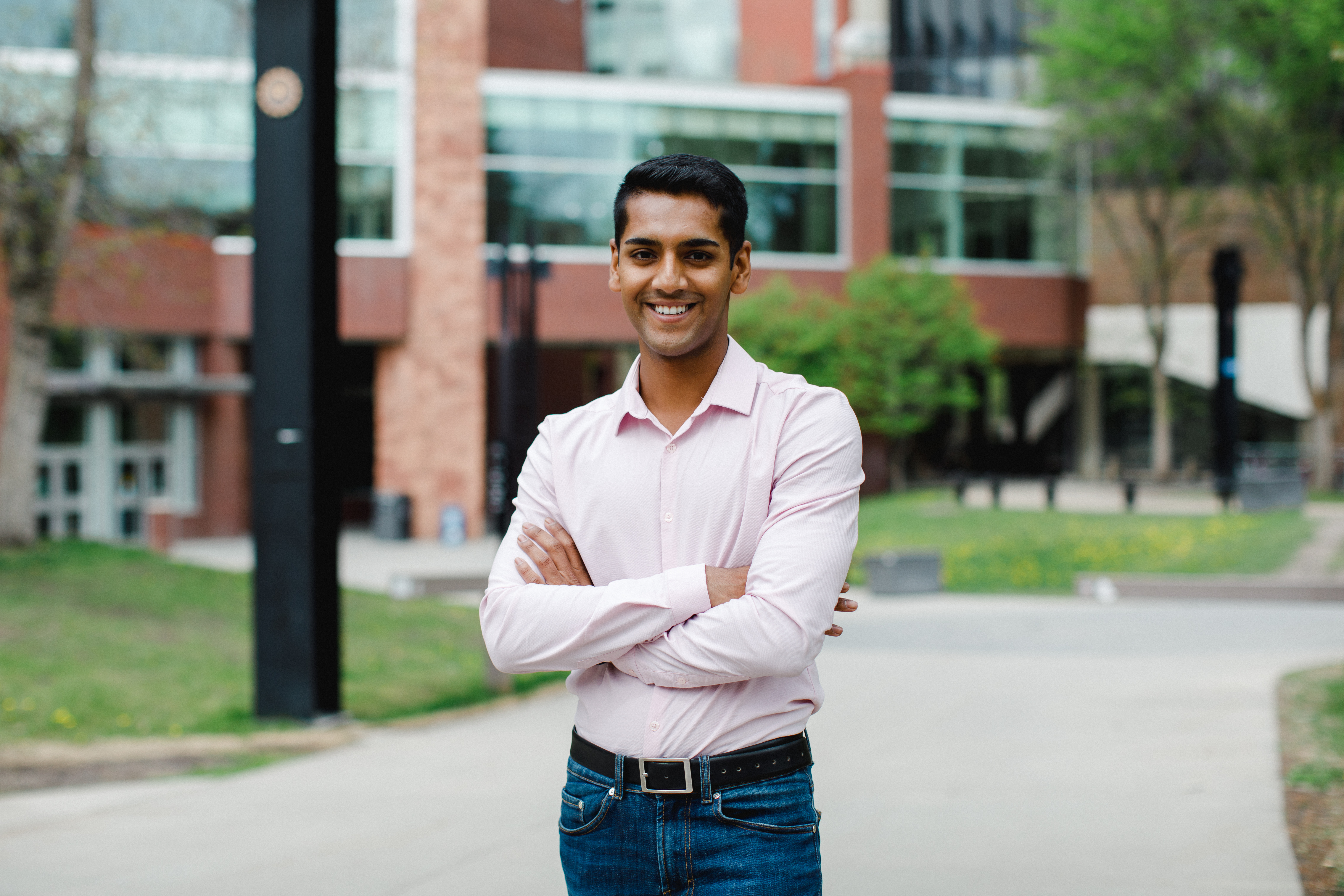
Engineering Physics Co-op student Kabir Nadkarni is following in the footsteps of our founding professor, William Muir Edwards. He is one of five engineering students being presented with the inaugural William Muir Edwards Citizenship Award-a $10,000 award in recognition of service to community.
(Edmonton) Citizenship, by the definition of the word, is about having legal status as a citizen of a state or nation.
By the highest intention of word, citizenship is about being an active member of your community, fostering the growth and health of the people around you. It's about embracing a responsibility to the world around you and acting on it.
When the University of Alberta's first engineering professor William Muir Edwards found a solution to a typhoid outbreak that was claiming lives in Edmonton at the turn of the century, or created a newsletter and gift service for soldiers fighting in the First World War, or when he sacrificed his life while caring for people afflicted with the Spanish Flu in 1918, he was setting an example of what real citizenship looks like.
A century later, an engineering physics co-op student, Kabir Nadkarni, is following in Muir Edwards's footsteps. He is one of five engineering students being presented with the inaugural William Muir Edwards Citizenship Award-a $10,000 award in recognition of service to community.
A global citizen
Nadkarni demonstrated citizenship when he was volunteering with SunSaluter overseas in Malawi, installing solar panels to provide energy in rural communities where some people had never seen a lightbulb before.
Being in Malawi gave Nadkarni an understanding of how populations that are vulnerable to the impacts of climate change have contributed little to the problem.
"That was a really interesting experience but reflecting on it down the road is, I think, what continues to motivate me today," he said.
Nadkarni has developed a "moral imperative for working towards resolving climate change."
Advocacy and responsibility
Nadkarni has spent the past two years working with the Paul First Nation, an indigenous band located 67 kilometres from Edmonton's downtown core. The band borders several large coal mines, and Nadkarni was initially interested in the public policy perspective of phasing out coal energy and the effect it would have on the community. Soon, he realized he "was kind of missing the human dimension to this" and "wanted to understand how communities are actually impacted by energy technology."
Nadkarni first began working with the Paul First Nation while on an engineering co-op work placement, but he wanted to work with the community further. He knew there was an unmet need in the community, so he listened to the concerns of the band members and found there was both concern and a lack of data about the air quality surrounding the band.
"This not only affects their public health, but it really affects some of their more vulnerable populations, like young kids and elders of the community, and not having access to this kind of basic data does not allow them to advocate for themselves."
Nadkarni is now working with a group of his colleagues and his supervisor to get the community their air quality data by using a drone equipped with sensors. They are currently designing and building a drone to meet these needs.
In the meantime, Nadkarni has been helping members of the Paul First Nation advocate for themselves by equipping them with the necessary knowledge about the effects of poor air quality. He has been doing public education classes around the community on the subject. He believes technological and engineering systems "are often so separate from the larger populations, and a lot of people aren't able to interact with them or understand how they influence them."
Nadkarni recognizes the agency he has in helping to fix this.
"As someone with a background in engineering, it is my responsibility to help bridge that divide."
William Muir Edwards Citizenship Award
The William Muir Edwards Citizenship Awards are made possible by the generosity of the David Morris Family Foundation. Nadkarni has shown responsibility, care, and a drive to help people gain advocacy over their communities.
The monetary component of the award allows Nadkarni to continue taking on unpaid community service projects. It will also help him pursue his Master's in an international school.
"I've always thought there is knowledge to be gained from other institutions and cultures," he said.
Nadkarni's community focus will be strengthened as "embarking on a new journey for my Master's will allow me to continue growing as a well-rounded community-minded engineer."
Nadkarni has meaningful words about the award and how it reflects the higher values of citizenship and engineering.
"Receiving this award is a humbling honour. It makes me proud to see the faculty not only recognizing me but also numerous other students for their community service, volunteerism, and civic leadership. Professor William Muir Edwards would probably have said that these qualities are all fundamental aspects to the calling of an engineer, so it's great to see that celebrated by the faculty in such a formal manner. I look forward to seeing how the William Muir Edwards Society inspires and cultivates an ever-more compassionate cohort of engineering students."